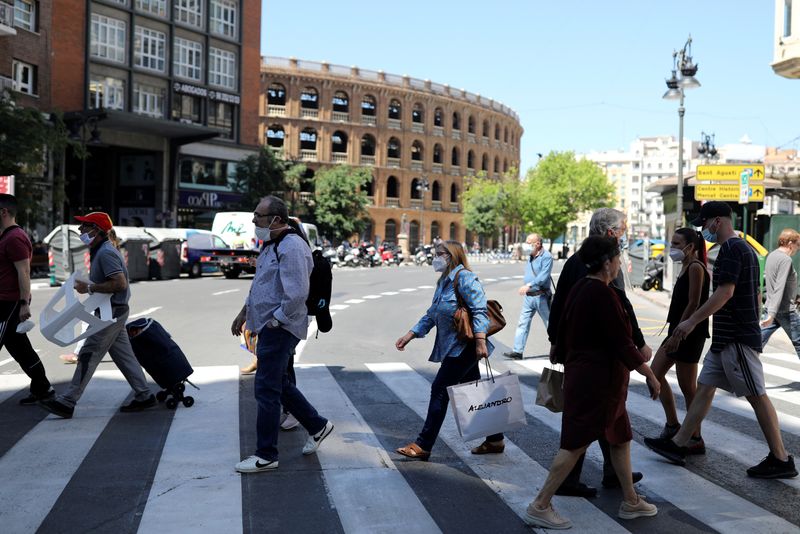By Belén Carreño and Emma Pinedo
(Reuters) - The end of the coronavirus lockdown in Spain failed to bring a surge in employment as government data showed that the 900,000 jobs lost at the pandemic's peak had not been regained, while the tourism sector has not yet returned to regular activity.
The number of people in Spain registering as jobless rose by 0.13% in June from a month earlier, or by 5,017 people, leaving 3.86 million people out of work, Labour Ministry data showed on Thursday.
The number of registered jobless people had risen in May by 0.68%. Overall there were 847,197 more jobless people in June than in the same month a year ago.
A net 99,906 jobs were lost in June.
According to data from the Social Security Ministry, on average 68,208 new jobs were registered in June compared to May, but 161,500 people were fired on the last day of the month.
The Social Security spokesman told a news conference that on the first day of July all that employment had already been recovered, and blamed these strong variations on the high temporary rates of the Spanish labour market.
On June 30, a large part of the ERTE furlough scheme in Spain expired. The extension of the scheme until September 30 did not apply to all the companies as conditions changed.
At least 1.17 million workers left the ERTE scheme in June.
The government expects to reduce its spending on employment benefits by 1 billion euros in June.
Although benefit spending data for last month is not yet available, in May, 5.52 billion euros was paid out in 6 million benefits, 3.3 for ERTE workers and 2.2 in jobless.
The Secretary of State for Employment, Joaquín Pérez Rey, expects at least 850,000 fewer benefits to be paid in june.
EDUCATION AND HOSPITALITY LAG
Education was the sector that dragged the jobs market in June, losing more than 45,000 jobs in a month, extending even its previous fall during the lockdown.
On the other hand, construction was the most dynamic sector in June, and has almost overtaken all the jobs lost in the closing.
The hospitality industry is the sector that has lost the most jobs yearly, with almost 300,000 jobs shed.
The opening of bars and restaurants in June helped 20,000 people to find employment in the sector, but it was insufficient to compensate for the massive loss of jobs at the peak of the pandemic.
Tourism accounts for almost 13% of the Spanish economy, largely thanks to foreign visitors. Schengen Area borders opened on June 21.

No tourists travelled to Spain in May for second month in a row because of the coronavirus lockdown, dragging income by more than 60% in the first five months of the year, the National Statistics Office (INE) said on Thursday.